COVID-19 RESPONSE - UNDP India
UNDP has been supporting the Government of India in strengthening capacities for controlling the COVID-19 pandemic with a focus on three priority areas: Health Systems Strengthening, Addressing Socio-economic Impacts, and Building Back Better.
UNDP in India has been supporting the Government of India in strengthening its capacities for controlling the COVID-19 pandemic through health systems support as well as enhancing social protection support and livelihood recovery programmes across various state geographies. The Second phase of UNDP’s response was focused on preparing, responding, and recovering, thus, expanding the response, building on lessons learned since March 2020 and encompassing UNDP’s socio-economic role. It was designed to help decision-makers make choices and manage complexity during uncertainty. UNDP’s response, in support of the national government’s efforts, recognizes the centrality of the government’s role and the availability of quality data as the cornerstone of the COVID-19 response.
UNDP identified and prioritized three key focus areas by mapping immediate and emerging demands from our partners on the ground against the tipping points that set a pathway beyond recovery, towards 2030. The areas are Health Systems Strengthening, Addressing the Socio-economic impact, and Build Back Better using new avenues such as rebalancing nature, climate, economy and digital disruptions and innovations for speed and scale of recovery.
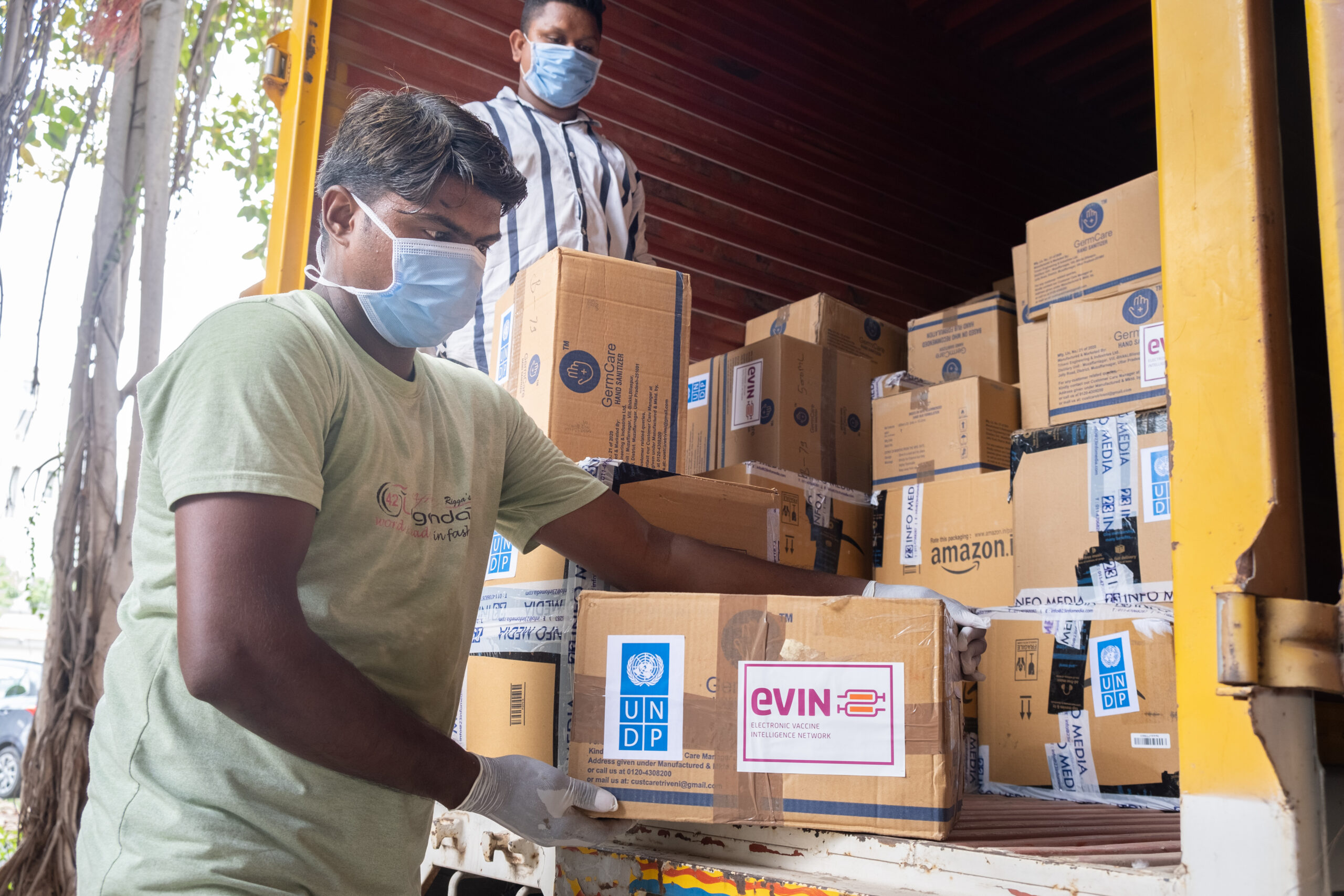
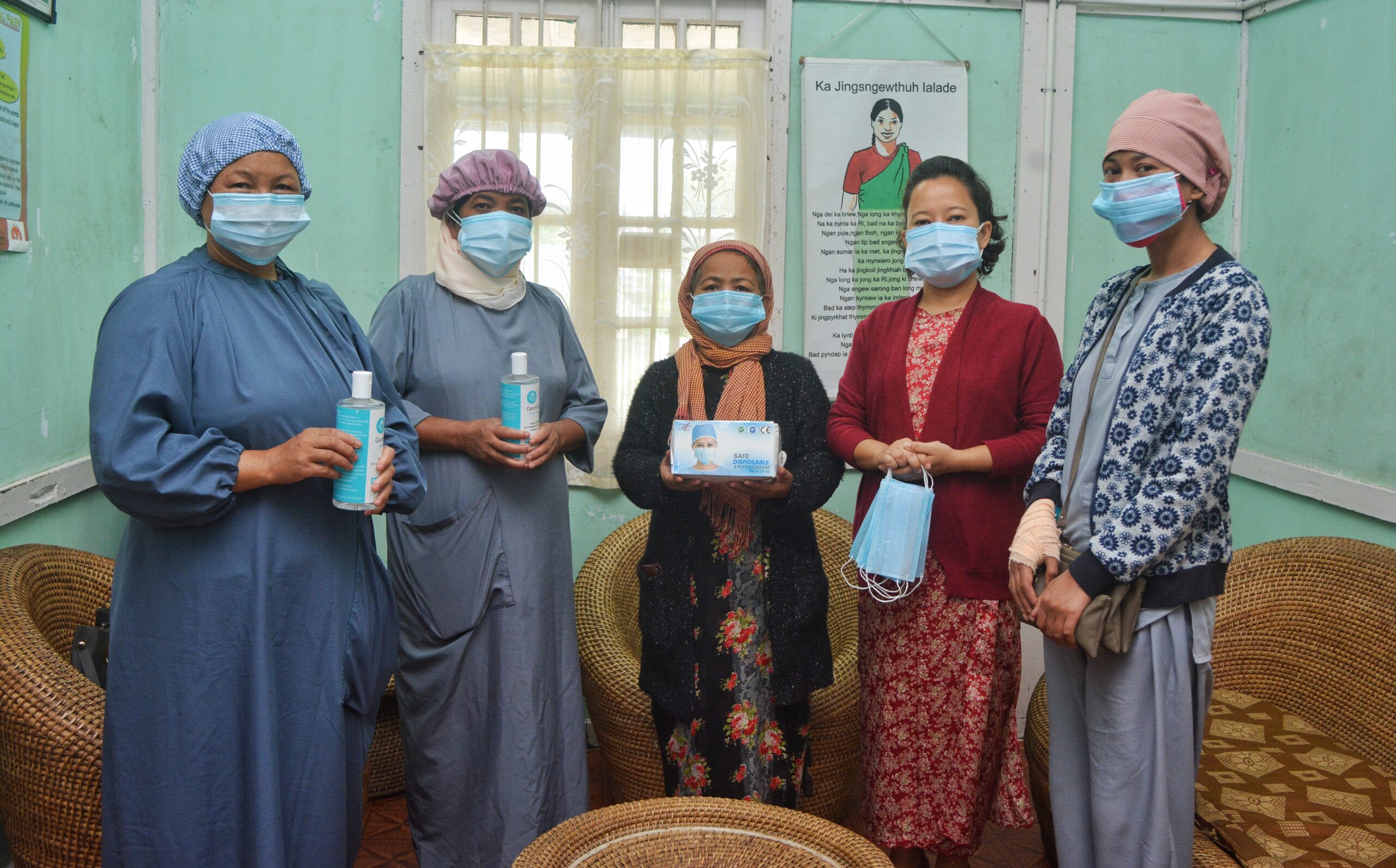
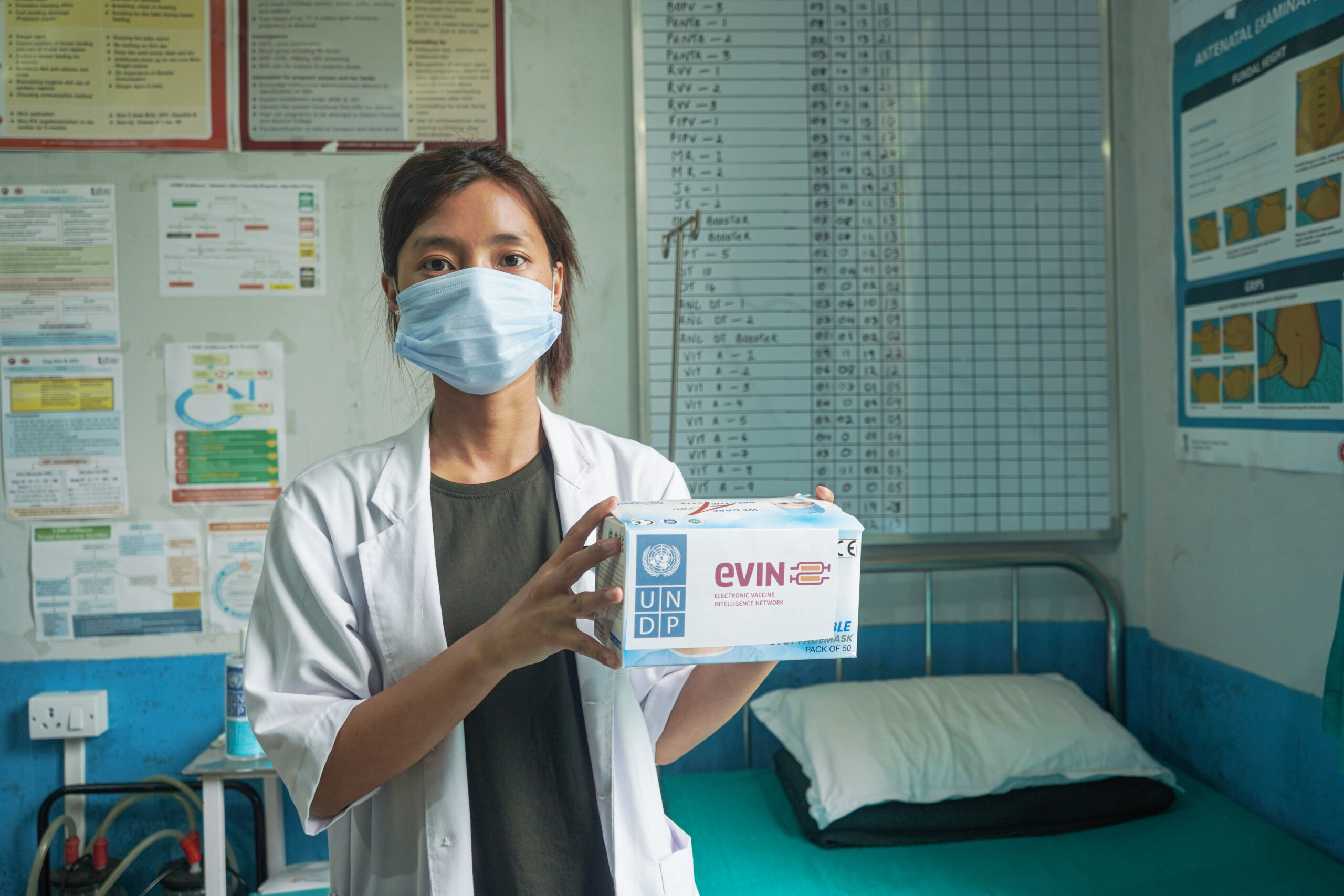
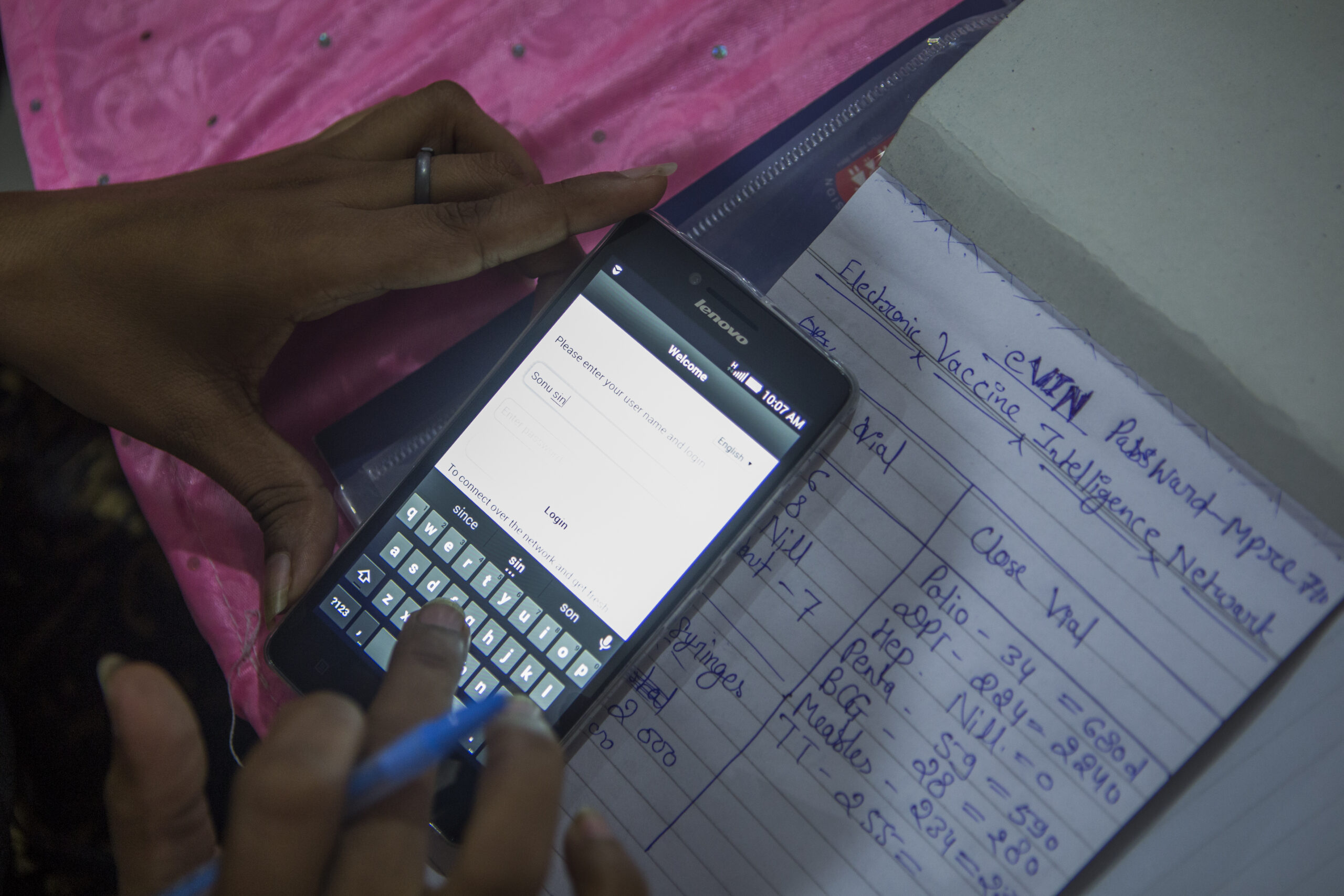
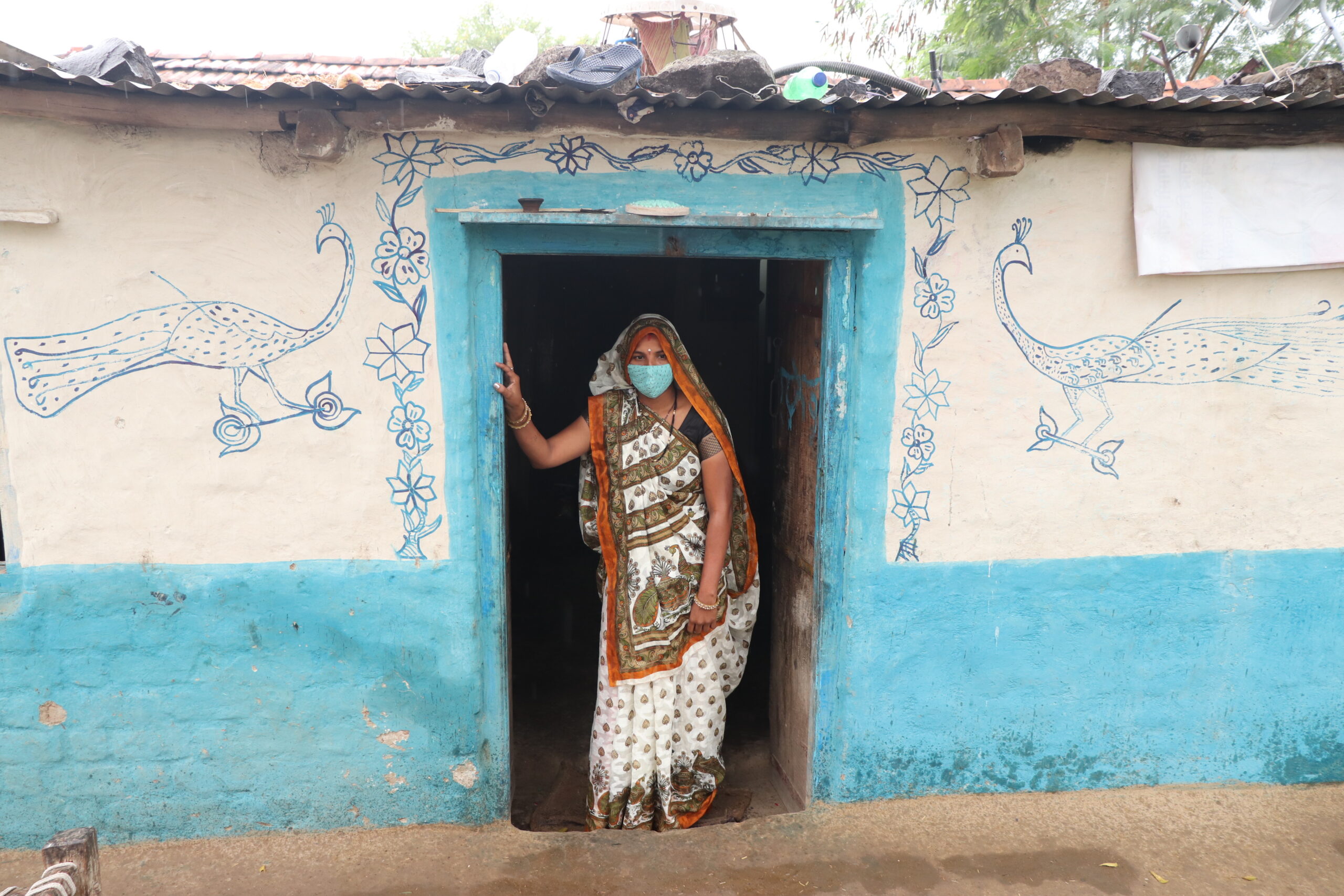
Health System Strengthening to Respond to COVID-19
UNDP helped to strengthen health systems by offering technical support during vaccination drives, procuring urgently needed health and medical supplies, supporting capacity building of health workers to respond to COVID-19, and amplifying the COVID appropriate behaviors etc.
UNDP had provided technical assistance to the Government of India for its COVID vaccination drive by implementing CO-WIN (Winning over COVID), a comprehensive cloud-based IT solution for planning, implementation, monitoring, and evaluation of the COVID vaccination drive. UNDP team under the guidance of the Ministry of Health and Family Welfare had developed the framework and design for the Co-WIN system. The CO-WIN system is an end-to-end solution developed by the Government of India that allows for creation of users (admins, supervisors, surveyors, vaccinators), registration of beneficiaries (bulk upload and individual registration), facilities/planning unit and session sites, communication with the beneficiaries followed by planning and scheduling sessions and implementation of vaccination process. The system has utilities for the entire public health system from the national level to the vaccinators at the last mile.
UNDP, through its strong HR network and technological support, also supported the on-field implementation of CO-WIN across the country. The tracking of beneficiaries by the CO-WIN system on a real time basis was complemented by tracking of vaccine stocks by the indigenous eVIN platform, developed and upscaled by UNDP across all public health facilities in India. The systems together monitored the utilisation, wastage of vaccines and immunization coverage of COVID-19 vaccination at the national, state, districts, and sub-district levels. UNDP teams in the states/ UTs extended support to the respective state and district administration for implementation of CO-WIN software-led vaccination drive, including capacity building of health workers to use the platforms, supply chain management, data monitoring, mapping progress and more.
UNDP amplified the MoHFW Communications materials on Covid appropriate behaviours and COVID vaccination through its social media handles, State and field teams. It trained more than 800,000 health and front-line workers to support the national vaccination campaign. In 12 States, UNDP supported capacity building, media advocacy, and community outreach for addressing stigma and discrimination associated with COVID-19 by
a) Developing and translating the “Stigma Handbook”
b) Designing a guide on “COVID Appropriate Behaviour”
c) Providing psychosocial support services through the UNDP – Tata Institute of Social Sciences (TISS) collaboration
It also provided Telecounseling support to overcome vaccine hesitancy and bust myths about vaccination using the MoHFW manuals. UNDP India designed and developed a mobile game titled “Corona Champion” to bust myths and spread awareness related to COVID-19 in 5 international and 7 Indian regional languages.
UNDP facilitated the procurement and installation of eleven Pressure Swing Adsorption technology-based Oxygen Generating Plants in North Eastern states of Meghalaya, Nagaland, Arunachal Pradesh and Tripura. UNDP also worked with the MoHFW and the State health departments for setting up medical equipment – including cryogenic tanks and oxygen generator plants, given that hospitals in remote areas like the North-Eastern states would face a lot of challenges in procuring and refilling oxygen cylinders. The health facilities were selected on needs-basis as identified by the respective state governments. The sites at the selected districts were readied, the plants were installed and production was started at the earliest. These eleven Oxygen Generation Plants with a total capacity of 3350 LPM (Litres per minute) will provide incessant medical grade oxygen supply to ten hospitals with an 1800 bed capacity.
In 8 states (Delhi, Gujarat, Uttarakhand, Chhattisgarh, Himachal Pradesh, Meghalaya, Arunachal Pradesh, and Nagaland), UNDP distributed 600,000 triple layer masks, 333,000 gloves, 15,000 hand sanitizers and 250 infrared thermal scanners to the State Health Departments. UNDP installed 80 ICU Ventilators, in four high priority states (Odisha, Assam, Jharkhand and Arunachal Pradesh) and trained frontline health workers on their functioning.
Addressing the Socio-Economic Impact of COVID-19
UNDP supported the analysis of the social and economic impacts of COVID-19 to inform policy and programming, and strengthened access to social protection to mitigate the impacts of crisis on vulnerable individuals, families and communities. In collaboration with State Governments, Civil Society Organisations, the private sector and UN agencies, this approach prioritized key sectors and vulnerable communities, including the urban poor, tribal communities, marginalized women and youth, disadvantaged groups, waste collectors, construction workers, migrants and returnees.
UNDP carried out two large scale scoping studies to understand the impact of the coronavirus pandemic and the subsequent lockdown(s) on the migrant community across several states of India. The first study was longitudinal. It analyzed the short- and medium-term impact of the pandemic and covered 10,023 migrant workers from six states in the first phase. Later, we were able to track 8,113 out of them in the second phase to gain insights into their coping strategies. Having noted some important differences in responses of female migrants compared to men, we conducted a separate study covering 10,161 female migrants from 12 States. The rationale behind these studies was to provide inputs for future programming of UNDP, to chart out pathways for recovery and to promote evidence-based planning.
UNDP also worked with NITI Aayog for constructing a national and sub-national Multi-dimensional Poverty Index (MPI) for India. A customized national measure will result in localizing the MPI, which captures multiple deprivations, according to national context and priorities, and will act as a policy tool for planning towards a post-COVID recovery.
UNDP reached out to 1.3 million people with information on accessing social protection schemes, enabling more than 428,924 people to access Government schemes.
UNDP trained 90,489 village and block level frontline functionaries regarding COVID measures and social protection schemes and programmes.
To expand access to social protection, UNDP mapped 411 social protection schemes in 6 States and integrated these into a digital GIS Enabled Entitlement Tracking Tool (GEET) to create awareness about the schemes. 79,170 Households and 83,386 individuals were informed about their eligible entitlements through GEET across 1308 villages.
UNDP strengthened the access to Social Protection schemes among PLHIV and Key populations in 12 high burden districts of 6 States. 109,862 individuals from these communities were reached with information on SP schemes and COVID 19 Prevention and 42,037 among them were linked to SP Schemes. 1222 functionaries working under the National AIDS Control Programme (NACP) were trained under this intervention.
UNDP supported 108,148 women and youth to access information on jobs and employability skills through online career guidance and counselling sessions, and more than 6,000 individuals have been linked with jobs.
UNDP reached out to 112,412 farmers, artisans and micro-entrepreneurs with information on livelihoods opportunities, COVID relief schemes and safety measures. UNDP trained over 42,000 farmers, artisans and micro-entrepreneurs on financial/digital literacy and on optimizing production.
UNDP supported the Department of Women and Child Development, Government of Madhya Pradesh in resurrecting the livelihoods of tribal communities in Dindori, in the south-eastern part of Madhya Pradesh. The support was structured around establishing food processing units for minor millets and non-timber forest produce along with establishing an umbrella brand ‘Andai’ for selling it in the open market, thereby facilitating direct access to market. As a result, around 6,400 tribal women drew their income by successfully processing their raw produce into a range of packaged edible items and selling it to various government agencies, buyers in the open market and directly selling it to customers via an online platform (andai.in and indiamart.com). UNDP was successful in creating sustainable market linkages in form of Business to Business (B2B), Business to Government (B2G) and Business to Consumer (B2C) which continues to grow even after scaled down intervention by UNDP in the last couple of months.
UNDP set up 9 helpdesks/helplines with Industry Associations in three States (4 in Karnataka, 4 in Maharashtra and 1 in Telangana) to support MSMEs with advisory, information, training and linkages support to ensure safe resumption of operations and business continuity. The helpdesks have, till date, provided one-on-one counselling to over 1900 MSMEs. Job mapping surveys with a few MSMEs were completed. 6,907 jobs were mapped of various job roles that were required by these MSMEs in the new normal. In total, 8923 MSMEs were supported through the helpdesks and through webinars.
UNDP launched a project titled “UTTHAN”; a specially designed programme for Sanitation Workers, ensuring better access to basic services such as education, health, shelter and social protection schemes of the Government in 15 cities, catering to 10,000 Safai Sathis. A social protection facilitation center was launched in 1 city and was also set up in additional 3 cities. A baseline assessment of more than 9,000 Safai Sathis was completed. Community mobilizers have till date enabled the registration of more than 700 Safai Sathis under various government related schemes. COVID-19 vaccinations were completed for 80 Safai Sathis, and an additional 400 Safai Sathis.
A digital application was launched by UNDP, in partnership with the State Government of Uttar Pradesh and Odisha to support the returnee migrants. The app tracked needs, skills and access to services by returnee migrants affected by COVID. The app captured data for 4.3 million migrants, which was used to support response and recovery programmes.
In States, UNDP supported capacity building, media advocacy, and community outreach for addressing stigma and discrimination associated with COVID-19.
In collaboration with iCALL TISS Mumbai, UNDP reached out to Implementing partners and community cadres to build their capacities on psycho-social support in 13 States. The trained Community cadres provided psychosocial support to the vulnerable populations at the grassroot level. iCALL started a customized helpline service in the 13 Project States for providing information on stigma and discrimination, COVID appropriate behaviors, addressing myths against vaccines, psychosocial support and linkages to Social Protection schemes and jobs/livelihoods.
Webinars and expert dialogues on stigma, discrimination and mental health reached 25,000 viewers on Facebook LIVE and messages challenging stigma and promoting COVID-19 appropriate behavior generated 9 million impressions on social media.
UNDP provided human resources (District Coordination Associate) in 14 districts for coordination on pandemic management, developing communication materials around Social Protection & Livelihoods.
In collaboration with NIMHANS, UNDP reached out to 9 states and the CSO partners to build their capacities to provide psycho-social support. Through Training of Trainer Workshops, NIMHANS built the skills for Psycho-Social competence among UNDP’s CSO partners. 330 participants across 61 CSOs were trained under this programme.
Build Back Better (Evolving response through Green Recovery and Digital Disruption)
UNDP anticipated that this is the moment to restore the balance between people and planet, designing and de-risking nature-based solutions as part of a new social safety net for the world, encouraging sustainable public-private partnerships such as in ecotourism and green transport systems, transforming agriculture from a carbon contributor to a carbon sink, and ensuring integrated thinking and action with the health sector to tackle air pollution that kills seven million people each year.
UNDP initiated the implementation of the pilot project which aimed to mitigate the social and economic impacts of COVID-19 and steer towards sustainable and inclusive pathways to recovery to build back better. UNDP worked with State Governments and partner organisations to strengthen advocacy, policies, and capacities to advance an integrated and multisectoral approach to green recovery, while directly reaching 17,000 people from vulnerable communities to expand access to nature-based jobs and livelihoods in selected four states. The outcomes were;
o Training and partnership platforms with Government and private sector to increase access to green jobs and livelihoods.
o Training and piloting and transfer of solutions for adoption and scale up of clean energy solutions and green infrastructure.
o Training, partnership platforms and digital solutions for the application of ‘One Health’ approach to strengthen prevention and management of zoonotic diseases.
o Dialogues, meetings, knowledge products and briefs to support advocacy for adopting green recovery pathways and expanding green financing.
UNDP and NITI Aayog initiated a Study on the horticulture supply chain in the North Eastern region to analyse the capacity of post-harvest infrastructure in the region and to propose a strategy to restore/develop the horticulture supply chain in the North Eastern Region. The study provided insights to promote and protect nature-based jobs/livelihoods and revive rural entrepreneurship. The study figured out the possibility of community based and owned solutions like Food Processing Organisations-based supply chains. This model was significant to all states since it generated employment, particularly for the female farmers.
UNDP was aware that closing the internet access gap would halve the human development regression. The focus was on helping governments and institutions to keep their doors ‘open’ by operating remotely through digital platforms; delivering critical government services, including healthcare, remotely; supporting better digital data integration and use for decision-making; and establishing digital payment platforms and e-commerce systems, with a focus on women-run small and medium enterprises and expanding digitalization for women.
As a part of the UNDP COVID-19 response, UNDP integrated the power of Information Technology to recover from the pandemic and move beyond to achieve the SDGs. UNDP State Office in Uttarakhand initiated technical support, mentorship to create an extension of Ajeevika, which created a two-sided marketplace between rural sellers and commercial buyers. This was aimed at recovery of the rural livelihoods affected by the pandemic.
The dashboard was developed for the state governments of Haryana, Punjab and Karnataka and it helped in timely implementation and real time monitoring of the Atmanirbhar Bharat economic stimulus package announced by the Government of India. This centralized web & mobile friendly platform assisted the state governments in the following ways: Helped the departments to set up a strong monitoring mechanism and dashboard; Measured the performance of the relevant departments against the target assigned to each department; Performed data analysis to understand the progress achievements of relevant Departments and their interventions. The application is currently exploring the possibilities for scaling up in other States.
Response to COVID Second Wave and follow ups
UNDP was primarily focused on supporting Government of India in its vaccination drive to ensure that all residents of the country were vaccinated in a timely manner. Government of India opened its vaccination drive to all above 18 years and UNDP India ramped up its technical support for CO-WIN to ensure the same in a phased manner. UNDP mobilized resources to support the Government of India in the following manner.
Procurement of Oxygen Generator Plants (PSA) and Oxygen Concentrators to address the shortage of Oxygen supply in District Level and Sub Divisional Level Hospitals.
- Spearheading a Communication Campaign to ensure that the vaccination drive reaches all citizens and no one is left behind.
- Supporting Government in countering vaccine misinformation and promoting COVID Appropriate Behaviors (wearing masks, social distancing, sanitizing), using online content produced weekly in multiple languages for broadcast on digital channels and media.
- Creating special strategy for vaccination of marginalized communities like homeless people, sanitation workers, PLHIVs etc.
- Amplifying the information reach and facilitation support to access the social protection schemes and economic restoration programmes.
- Support in restoring the livelihoods of marginalized communities affected by the pandemic through skilling, ensuring livelihood opportunities etc.
In the best traditions of emergency preparedness, we should ‘hope for the best, but plan for the worst’. The recovery path from COVID-19 is likely to see societies and economies opening and contracting with the waves of the pandemic. In this undulating new world of co-existing with COVID-19, countries and societies will need to deeply invest in new capabilities and capacities to rapidly adapt, anticipate change, manage risks and implement solutions to build a better normal. UNDP in India reaffirms its commitment to work with Government of India in combatting the pandemic and ensuring a sustainable recovery.

